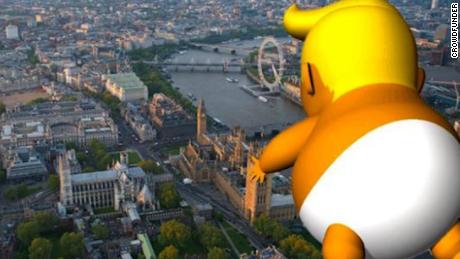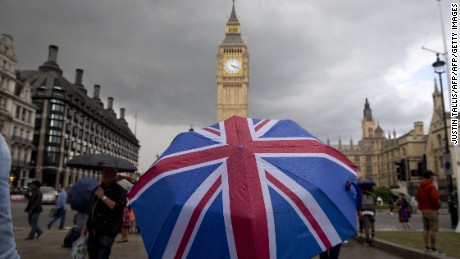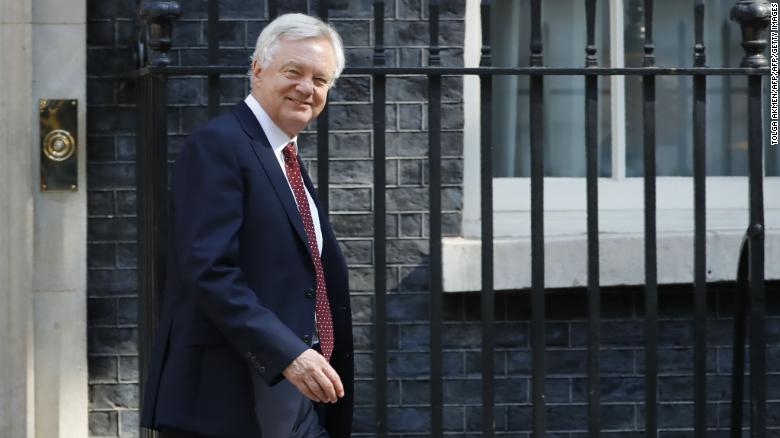David Davis resigns as UK Brexit Secretary over May's EU plan
(CNN)The man responsible for overseeing the UK's exit from the European Union has resigned, citing irreconcilable differences with Prime Minister Theresa May, a move that threatens to destabilize her government.
In a resignation letter sent to May late Sunday night UK time, Brexit Minister David Davis said it was looking "less and less likely" that the Conservative-led government would be able to deliver on its "manifesto commitment to leave the Customs Union and the Single Market."
The departure of a key minister could lead to further resignations and throw May's government into chaos just as it enters a key period of negotiations with the EU.
It comes as May is preparing for a state visit by US President Donald Trump later this week, and faces a potential new international crisis after a British citizen died as a result of being exposed to Novichok, the same nerve agent used to poison former Russian spy Sergei Skripal and his daughter.

Play Video
'Trump baby' balloon approved by London mayor
No fan of the plan
Davis' resignation follows on the heels of a "business friendly" plan for Brexit agreed by May and her government on Friday at Chequers, the Prime Minister's country house.
The proposal, which was announced at the end of a crucial summit, seeks to preserve frictionless goods trade for the EU and avoid border checks and tariffs, most feared by manufacturing companies.
In a response to Davis, May said she was sorry he had chosen to leave the government "when we have already made so much progress towards delivering a smooth and successful Brexit."
May added that on Friday, "we as the Cabinet agreed a comprehensive and detailed proposal which provides a precise, responsible, and credible basis for progressing our negotiations towards a new relationship between the UK and the EU after we leave in March."
In his letter, Davis said he was "unpersuaded that our negotiating approach will not just lead to further demands for concessions," and said the national interest required someone in his position to be an "enthusiastic believer in your approach, and not merely a reluctant conscript."
The June 2016 vote to leave the European Union effectively ended a relationship which had endured for 44 years. Article 50 of the Lisbon Treaty outlines the voluntary departure, which will take effect in March 2019.
Failure to agree conditions with the EU before March would result in a "no-deal" Brexit that could wreak havoc on the UK's relationship with its biggest export market, leaving it with no arrangements on staying in or having access to the customs union and single market.
The EU has long maintained that countries outside the single market cannot enjoy its benefits, and exiting it could lead to a hard border in Ireland that many fear could reverse Northern Ireland's hard won peace.
Multiple major British businesses have warned May she needs to secure a Brexit deal or face potentially ruinous consequences for the UK economy.
Annmarie Elijah, associate director of the Center for European Studies at Australian National University (ANU), said Davis' resignation makes the likely survival of the Chequers deal "look very tough indeed."
"Whatever the internal wrangling, the fact is that the UK needs to consolidate a position, and fast, in order to negotiate with the EU27," she added.

Play Video
Brexit countdown: Have minds changed?
'Government in chaos'
Opposition leader Jeremy Corbyn said that Davis' resignation "at such a crucial time" shows that May "has no authority left and is incapable of delivering Brexit."
"With her government in chaos, if she clings on, it's clear she's more interested in hanging on for her own sake than serving the people of our country," the Labour Party leader said on Twitter.
Nicola Sturgeon, the Scottish First Minister, tweeted early Monday that the "UK government is in utter chaos and ebbing authority by the day."
One of many Euroskeptics in May's Cabinet, Davis was a high profile supporter of the Leave campaign during the Brexit referendum, putting him at odds with the Prime Minister, who supported remaining within the EU.
During his time as Brexit secretary, he clashed with May repeatedly, and his resignation risks widening divisions within the Conservative Party over Europe, with all eyes on whether anyone will be nominated to replace him, or if fellow Leave campaigner and May critic Foreign Secretary Boris Johnson will follow him out of the door.
Davis' deputy, Steve Baker, and another Brexit minister, Suella Braverman, also resigned Sunday, according to the UK's Press Association.
On Twitter, some Conservative members of parliament were cheering Davis' announcement, with backbencher Andrea Jenkyns -- who quit the government in May to "fight for Brexit" -- calling on Johnson to resign as well.
Jenkyns said she would "100%" submit a letter to the Conservative Party's influential 1922 committee supporting a vote of no confidence in May's leadership.
"Theresa May's premiership is over," she told BBC Radio 4 early Monday morning. "The time has come that we need a Brexiteer Prime Minister."
Neither Johnson nor fellow Cabinet Brexiteer Liam Fox have yet publicly spoken in support of May's "business-friendly" deal. Jacob Rees-Mogg, promoted by right-wing Conservatives as a potential successor to May, retweeted a snap poll of party members on Sunday which showed three in five thought May's plan was a "bad deal."
"Without David Davis there, without his imprimatur, it will be very difficult for (May's Brexit proposals) to get the support of Conservative MPs and therefore the prime minister would be well advised to reconsider them," Rees-Mogg told BBC Radio 5 late Sunday.
Nigel Farage, former leader of UKIP -- the right-wing anti-Europe party which many credit with pushing the Conservatives into backing a Brexit referendum -- called on May to be ousted following Davis' resignation.
"May's response (to Davis) shows that she is controlled by the civil service," Farage said. "For Brexit to succeed we must get rid of this awful, duplicitous PM."
In January, Farage called for a second referendum to silence Brexit doubters, and recently suggested Britain lost World War II because the nation was "bankrupted" and "our big imperial possessions started to disappear."

Play Video
How Brexit could end flights in and out the UK
Another election?
Long before the Brexit referendum and its aftermath, the Conservative Party was split on Europe, and May has struggled to unite the warring wings under her leadership.
An attempt to enlarge her parliamentary majority with a snap election -- that would have allowed her to sideline Euroskeptic Conservatives and pursue her own vision of Brexit -- ended in embarrassing failure and almost saw the Party lose control of government.
The government currently only has a whisker-thin majority, thanks to the support of the right-wing Northern Irish Democratic Union Party (DUP). Another general election could be called if May loses a vote of no confidence in the House of Commons.
In the wake of Davis' resignation, many figures on the left, including Labour shadow chancellor John McDonnell, have called on May to resign.
Polls have consistently put the Conservatives neck and neck with Labour, at roughly 40% each, though Corbyn's party previously saw a major boost once election campaigning began. A recent YouGov survey found 69% of respondents thought Brexit was going badly, with two thirds blaming the government.
Elijah, the ANU expert, said "uncertainty has become the new norm in British politics."
She predicted pro-Brexit Conservatives would be willing to risk another general election if May didn't concede to their demands, "such is their opposition to a soft Brexit."
CNN's Charles Riley, Darran Simon and Flora Charner contributed to this report.
News Courtesy:www.cnn.com











